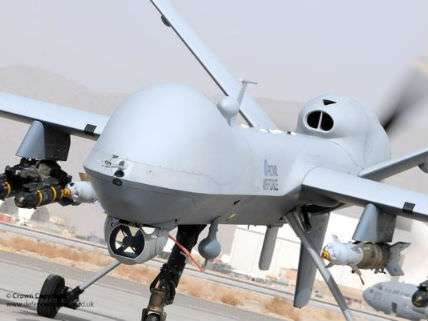Behold! 3 Drones of the Near Future

Drones aren't going away any time soon. In fact, they're going to be more present than ever in our skies, seas, and on land. Some of us might even buy them for ourselves.
As Shane Harris previous wrote for Reason, not only is "the military is planning for a future that relies more on drones than it does on manned planes," but also "the market in domestic drones [is] poised for takeoff. A drone revolution is coming." Below are a few pieces of unmanned technology, some of which are already being implemented. (Others are still at the drawing board.)
1. Unmanned Aerial (and Aquatic and Terrestrial) Vehicles
Sandia National Laboratories are developing and testing "multi-modal vehicles" that can fly, swim, drive, and jump. All of these features are operated through a single interface. Concept videos show the vehicle's ability to drop exterior layers, such as its wings when it hits the water and its paddles when it drives onto land. Sandia anticipates that the Volant will provide quick, flexible assistance to manned operations without requiring a whole army of robots outfitted exclusively for certain situations.
The Volant's design is not without drawbacks, though. Wired explains that "because it sheds parts and material as it transforms from one mode to another, recovery is almost impossible — making every mission an expensive one-way trip."
2. The Rail-Launched Stealth Bat
The Bat is a drone with a blended wing body that makes it stealthier than conventional designs. It also relies on a mobile hydraulic-rail launcher for take off and a large net for recovery.Unlike larger, more cumbersome combat drones, the Bat does not require a runway. Being freed from the tarmac allows this drone to take off in rougher environments.
The Bat may be small, but it is fierce. Current models comes in 10 to 12-foot wingspan, can fly 70 mph, and can carry a 3.2 cubic foot payload. Until recently, this drone was resigned to "intelligence, surveillance, reconnaissance, target acquisition and communications," according to Northrop Grumman, producer of the Bat. But, it was recently outfitted with a "miniature electronic attack payload" that makes it capable of engaging in combat.
3. Drones for Personal Use
Frog, a product strategy and design firm, is working on ways to integrate unmanned aerial vehicles into daily activities and transform them into "off-body wearables." These small drones would be privately owned tools more akin to a flying roomba than a war machine.
The Guardian Angel concept drone would fly along with its owner on jogs. Guided by a signal from a heart-rate monitor, this drone "helps you adjust your performance by providing instant feedback," according to the design team. Other designs include the "Paparazzi" drone that would film its owner for social media purposes. Or at least that's the idea. The company doesn't anticipate completing these devices until 2020.


Show Comments (42)